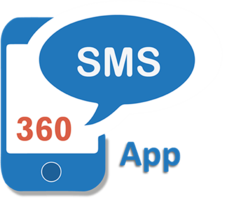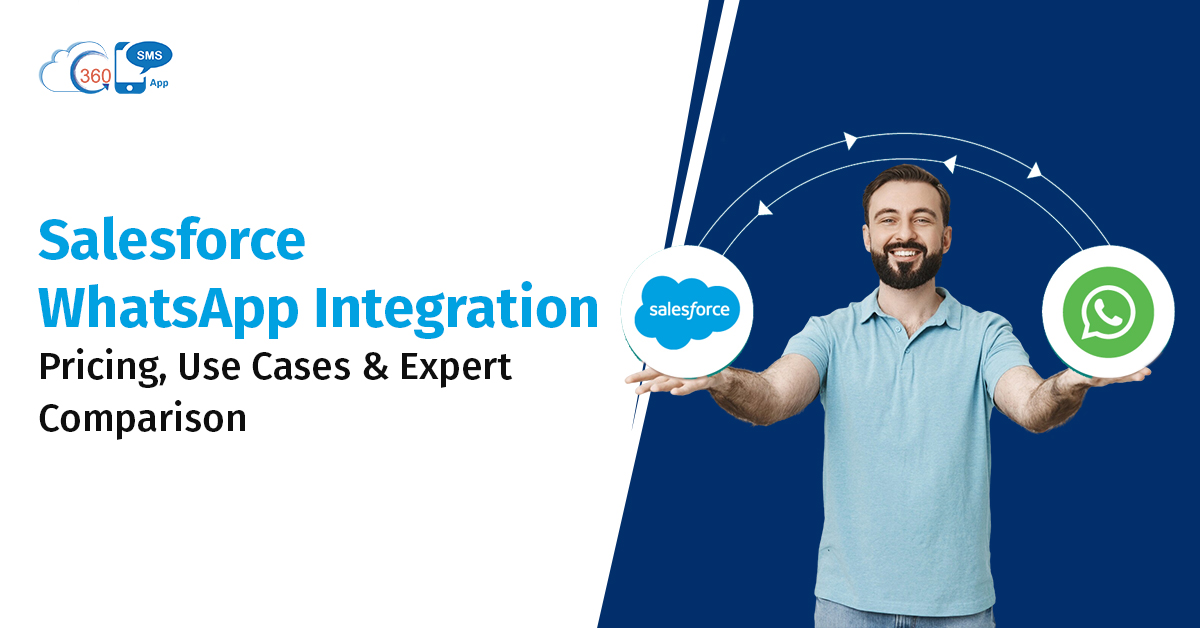These days, media-rich interactions have become crucial for smooth and effective operations and closures. Think of a sales professional who is on the final stage of closing a deal. But before that, the person needs to send some related documents to the client for signature. Here’s the need for a quick, convenient, and widely used channel to securely share PDFs. Now, imagine a scenario for a service team: a customer is trying to explain a technical issue that one can only understand if they send a quick screenshot of an error message. In these moments, again, a reliable channel is needed to share visuals.
The solution lies in meeting your customer on the most popular messaging app in the world: WhatsApp.
Salesforce Integration with WhatsApp is a well-thought-out approach that allows you to exchange media files, such as photos, documents, PDFs, and more, from your CRM. This allows you to have personalized, high-value conversations that set the stage for conversions. This guide will walk you through the benefits, break down the often-confusing Salesforce WhatsApp pricing, and show you how different platforms measure up.
Salesforce WhatsApp Integration: Complete Overview
What exactly is Salesforce Integration with WhatsApp? It is the process of linking your Salesforce organization to WhatsApp’s Business platform. This way, your business gets an official and trusted WhatsApp presence to communicate at scale and maximize responses.
This integration is critical because it turns a consumer app into a professional tool for measurable outcomes. It ensures that every conversation is automatically logged against the correct Lead, Contact, Case, or Opportunity record in Salesforce. In addition, the app’s performance will never be an issue for you.
A native platform lets you use Salesforce WhatsApp messaging for:
- Rich Media: You can send and receive photos, videos, and PDFs (like invoices or contracts).
- Official Templates: You can send automated messages using templates that are already approved. Thus, no compliance issues.
- Two-Way Conversations: Your agents manage customer replies right inside Salesforce.
This kind of integration gives your team all the information they need. Therefore, you can provide world-class service, making the customer experience feel personal and quick.
WhatsApp for Marketing Cloud & Service Cloud
WhatsApp is a powerful tool across the entire customer lifecycle, not just for basic service.
Marketing and Sales (Marketing Cloud)
Salesforce Marketing Cloud WhatsApp allows you to move beyond promotions that might be ignored. With WhatsApp, you can instantly provide potential customers with rich, interactive content at every step.
- Product Catalog Sharing: Instead of forcing customers to download a PDF or browse a complicated webpage, you can send them a visually engaging, interactive product catalog directly through WhatsApp. This allows you to show high-quality images and specific pricing instantly.
- Conversational Promotions: You can use Salesforce WhatsApp messaging to send targeted, highly engaging promotions to customers who have explicitly opted in. For example, announcing a loyalty program upgrade or starting a quick, two-way survey about their needs to qualify them for a special flash sale.
Service and Support (Service Cloud)
For service teams, WhatsApp is all about speed and making things convenient:
- Resolve Support Cases Faster: Customers prefer texting their questions for help. You can use a WhatsApp chatbot to handle FAQs. Also, it can instantly send complex problems to a human agent for quality support.
- Send Key Alerts: You can send important updates right through WhatsApp, such as notifying customers about an outage or when a technician will arrive. WhatsApp’s high delivery rate means your alerts are seen fast.
Pricing, Implementation, and Compliance
Understanding Salesforce WhatsApp Pricing and setup can be complex, as it involves three parties: Salesforce, the integration partner (the app), and Meta (WhatsApp’s owner).
Pricing Structure
You will typically face three main costs:
- Platform Fee: This is the cost for the integration app itself (usually paid monthly or yearly).
- Usage Fees (Meta): Meta charges you per conversation, not per message, based on the type of message you want to send (Marketing, service, utility, etc.) A “conversation” starts when a customer texts you, or when you send the first automated message.
- Salesforce WhatsApp Message Credits: To use WhatsApp in Salesforce, you must purchase WhatsApp message credits, which vary by country and category. This is an extra cost on top of meta pricing.
Implementation and Compliance
Set up requires selecting a verified Salesforce Integration with a WhatsApp partner from the AppExchange. They handle the technical connection to Meta.
Compliance is non-negotiable. You must have clear opt-in consent from the customer before initiating any message. WhatsApp’s rules require the use of pre-approved Message templates for all automated, outbound communication. This ensures your interactions are professional and adhere to platform policies.
360 SMS App vs Other WhatsApp Platforms
When you compare different options for Salesforce Integration with WhatsApp, you need a platform that doesn’t just connect to WhatsApp—it needs to enhance your overall communication strategy in Salesforce.
While many top-tier partners offer foundational features, the 360 SMS App is fundamentally different because it gives you advanced tools that others often miss or only offer in a basic format.
- True Multichannel Messaging: Why stick to WhatsApp or SMS only when you can get 15+ channels by integrating simply one app? 360 SMS gives you a single, unified app for SMS, WhatsApp, and more, along with a unified inbox to manage conversations effortlessly. You don’t have to switch between different tools. Even if you’re looking forward to boosting your Salesforce Marketing Cloud WhatsApp messaging, 360 SMS experts can help you simplify workflows, automation, and much more.
- Texting Agents (AI Superpowers): Other solutions might limit you to basic AI features; 360 SMS gives your agents advanced AI-powered tools inside Salesforce. Your team gets real-time message translation, can instantly rephrase and polish replies, and the AI provides conversation summaries & next steps. This not only makes your team incredibly efficient but also allows them to make a mark with WhatsApp messaging.
- Point-and-Click Automation: Many apps limit you to heavy coding automation. 360 SMS lets you use a simple, point-and-click tool to set up automated messaging, including WhatsApp.
- Future-Ready & AI-Powered Compliance: With 360 SMS, you get built-in AI tools. These tools check for spam risk and score the quality of every template. Plus, the AI manages opt-outs based on what the customer means, not just the keyword they type. This makes compliance easy for you.
By choosing 360 SMS, you get the full, future-proof solution. It turns WhatsApp into a powerful channel that gives you unique smarts and simplicity.
Expert Opinion: When to Use WhatsApp in Salesforce CRM
Experts feel that you should use Salesforce WhatsApp messaging for interactions that are personal, time-sensitive, and need to be media-rich. With WhatsApp, you can send:
- High-Value Notifications: Send personalized payment alerts, security codes, or official documents as WhatsApp’s verification makes it a trustworthy platform.
- Visual Support: If your customer needs to send a picture of a broken product or a screenshot of an error, WhatsApp is essential. You simply cannot do that easily with traditional SMS.
- Global Reach: If your customers are in places where WhatsApp is preferred (like Latin America, India, or Europe), you must integrate it to stay competitive.
If personalized, media-rich communication via a widely popular channel is your business priority, then you must consider connecting WhatsApp to your CRM.
Final Thoughts
The adoption of AI in combination with popular apps like WhatsApp is definitely a futuristic approach. By opting for Salesforce integration with WhatsApp, you can quickly connect with your audiences meaningfully through tailored interactions and tap into media-rich conversations, improving customer experiences.
WhatsApp helps you add new dimensions to your different operations, such as sales, marketing, and support. As a result, you witness more engagement from your prospects and customers, which further multiplies your business ROI, justifying the Salesforce WhatsApp pricing you have paid. Whether it is about the Salesforce Marketing Cloud WhatsApp, or smarter WhatsApp chats with AI, a futuristic app always helps stay competitive.
By choosing a full-featured, native partner like 360 SMS, you have everything you need to boost your customer experiences, along with the best channels to connect. Don’t just find your customers; impress them with how fast and smartly you interact.
Ready to make your WhatsApp messaging future-proof with AI?

